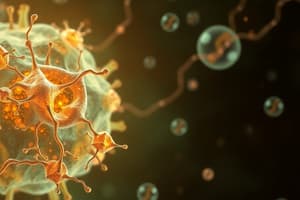Podcast
Questions and Answers
What is the main focus of pharmacokinetics?
What is the main focus of pharmacokinetics?
- How the body processes a drug (correct)
- The mechanisms of drug interactions
- The therapeutic responses of drugs
- The effects of drugs on biological structures
Which of the following is a key aspect of pharmacokinetics?
Which of the following is a key aspect of pharmacokinetics?
- Effects of drugs on specific targets
- Excretion rate constants (correct)
- Mechanisms of drug interactions
- Therapeutic responses of drugs
What is the main focus of pharmacodynamics?
What is the main focus of pharmacodynamics?
- Therapeutic responses of drugs
- Mechanisms of drug interactions
- How the body processes a drug
- Effects of drugs on biological structures (correct)
What does drug metabolism primarily involve?
What does drug metabolism primarily involve?
Which area of pharmacology focuses on the interactions between living organisms and chemicals called drugs?
Which area of pharmacology focuses on the interactions between living organisms and chemicals called drugs?
What is the primary site of drug metabolism in the body?
What is the primary site of drug metabolism in the body?
How does aspirin differ from ibuprofen in terms of enzyme binding?
How does aspirin differ from ibuprofen in terms of enzyme binding?
What are the key factors that clinical pharmacology evaluates in treatment outcomes?
What are the key factors that clinical pharmacology evaluates in treatment outcomes?
What is the purpose of drug metabolism in the body?
What is the purpose of drug metabolism in the body?
How does ibuprofen relieve pain and inflammation?
How does ibuprofen relieve pain and inflammation?
Flashcards are hidden until you start studying
Study Notes
Exploring Pharmacology: Understanding Pharmacokinetics, Pharmacodynamics, Drug Metabolism, and Clinical Pharmacology
Pharmacology is the scientific discipline focused on understanding the interactions between living organisms and chemicals called drugs. To appreciate its breadth and depth, we'll delve into some of its fundamental areas—pharmacokinetics, pharmacodynamics, drug metabolism, and clinical pharmacology.
Pharmacokinetics
In essence, pharmacokinetics helps us predict how our bodies process a drug once it enters them. This includes aspects such as absorption, distribution, metabolism, excretion (ADME), and their rate constants. For instance, if you take acetaminophen, your body will first absorb it from your gastrointestinal tract before being distributed throughout various tissues. As your liver breaks down this medication via enzymatic reactions, it eventually gets eliminated through urine. These processes determine the concentration of acetaminophen within different body compartments over time, thus influencing its efficacy and safety.
Pharmacodynamics
Contrary to pharmacokinetics, which focuses on what happens to a drug inside the body, pharmacodynamics deals with the effects that a drug has upon biological structures and functions. Essentially, this field investigates the mechanisms by which medications interact with specific molecular targets to elicit therapeutic responses —or undesirable side effects. For example, ibuprofen inhibits cyclooxygenase enzyme pathways leading to reduced prostaglandin synthesis, ultimately relieving pain and inflammation. On the other hand, aspirin irreversibly binds to these enzymes, causing chronic pain relief but also increasing bleeding risk. By exploring these relationships, we can understand why some medicines work better than others—and what potential drawbacks might exist.
Drug Metabolism
Drug metabolism plays a pivotal role in shaping the fate of administered chemical entities, converting them into more polar molecules that are easier to eliminate from the body. It primarily occurs in the liver where numerous phase I and II biotransformation enzymes reside, working together to detoxify xenobiotics. This vital process may lead to either the formation of active metabolites, capable of augmenting drug efficacy—such as codeine undergoing O-demethylation to form morphine—or, conversely, inactive products ready to be expelled from the body.
Clinical Pharmacology
Clinical pharmacology represents the application of pharmacological principles within clinical settings, aiming to optimize patient care while minimizing risk. Through rigorous experimental design, randomized controlled trials, meta-analyses, and case studies, researchers evaluate novel therapies' efficacy, safety, and optimal dosage regimens. Moreover, they explore the influence of individual variability on treatment outcomes, including genetic differences, age, gender, disease status, concomitant illness, and self-administered factors like diet and lifestyle choices. Ultimately, the goal is to translate findings into evidence-based guidelines, thereby facilitating informed decision-making among healthcare providers when prescribing drugs.
Understanding these interrelated fields lays the groundwork for rational drug therapy development and optimization. Uncovering new knowledge continues to push boundaries across pharmaceuticals, leading to innovative treatments that improve patients' lives worldwide.
Studying That Suits You
Use AI to generate personalized quizzes and flashcards to suit your learning preferences.




